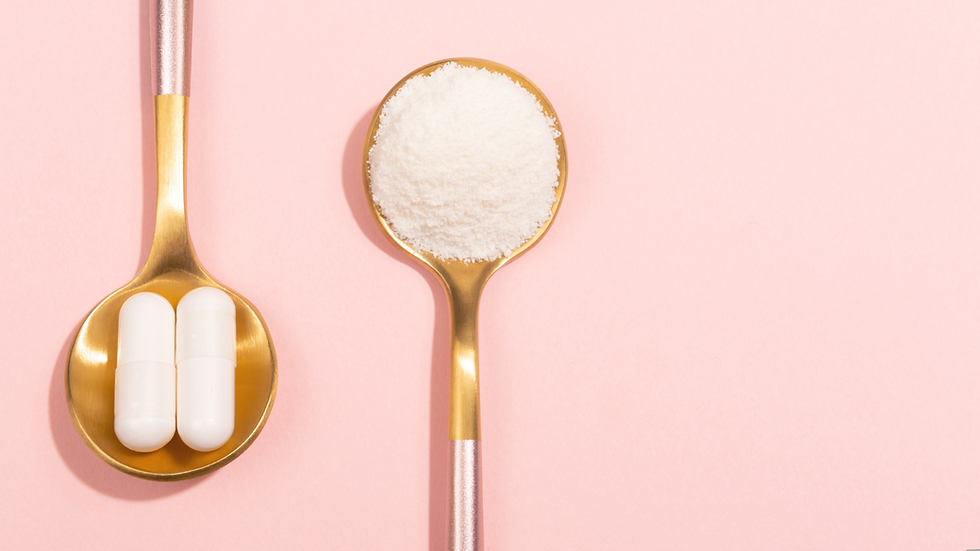Collagen for Joint Health: Hype or Help?
- 2110 Fitness

- Jul 24, 2025
- 4 min read
Collagen has become one of the most popular dietary supplements on the market, praised for its potential to improve joint function, skin elasticity, bone density, and even muscle mass. But does the science support the hype? For adults between 30 and 65—especially those experiencing the early signs of aging or joint discomfort—the question isn’t just academic. It’s practical: Is collagen worth incorporating into your daily routine?

Collagen is the most abundant structural protein in the human body. It makes up about one-third of total protein content and plays a vital role in connective tissue—found in cartilage, tendons, ligaments, skin, bones, and muscles. As we age, natural collagen production declines, typically beginning in our 30s. This leads to joint stiffness, reduced skin elasticity, and slower recovery from activity or injury.
There are multiple types of collagen, but the most commonly studied for joint and tissue health are Type I (skin, tendon, bone), Type II (cartilage), and Type III (reticular fibers in skin and blood vessels). Most supplements contain hydrolyzed collagen (collagen peptides), which are broken down into smaller, more easily absorbed amino acid chains. Some products use undenatured Type II collagen (UC-II), which may act through immune modulation.
The strongest body of evidence for collagen supplementation lies in joint health. A number of placebo-controlled studies suggest that collagen peptides or UC-II may reduce joint pain and improve mobility, particularly in populations with osteoarthritis or exercise-related joint stress.
A 2012 double-blind, placebo-controlled study published in the International Journal of Medical Sciences examined the effects of UC-II on individuals with knee osteoarthritis. Participants who received just 40 mg/day of UC-II for 90 days reported significant improvements in knee extension and overall function compared to placebo (Crowley et al., 2009).
Similarly, a 2018 review in Current Medical Research and Opinion found that collagen peptide supplementation (typically 5–10g/day) was associated with statistically significant improvements in joint pain among athletes and older adults. The mechanism? Collagen appears to stimulate chondrocyte (cartilage cell) activity and reduce inflammatory markers, which can both protect and rebuild joint tissue over time (Zdzieblik et al., 2017).
Still, it’s important to recognize that while promising, these studies often have small sample sizes and are sometimes funded by supplement manufacturers. Yet the physiological plausibility, low risk profile, and repeated favorable outcomes make collagen a reasonable consideration for joint support.
Although joint health is where collagen shines most consistently, emerging data suggests potential benefits for skin, muscle, and bone health as well—though results are more mixed.
In terms of skin health, randomized trials have shown that collagen peptides can improve skin elasticity, hydration, and dermal collagen density. A 2019 meta-analysis published in the Journal of Drugs in Dermatology found that 8–12 weeks of collagen supplementation led to improvements in skin elasticity and moisture compared to placebo.
For bone density, one small 2018 trial published in Nutrients followed postmenopausal women for 12 months. It found that collagen peptides (5g/day) improved bone mineral density in the spine and femoral neck, possibly by stimulating osteoblast activity.
Muscle mass is the least established benefit. Some studies, such as a 2015 trial in The British Journal of Nutrition, showed that combining collagen supplementation with resistance training in older men led to greater gains in fat-free mass compared to exercise alone. However, collagen is not a complete protein and lacks high levels of leucine—an amino acid critical for muscle protein synthesis—so its use as a primary muscle-building supplement is questionable.
For adults experiencing mild joint discomfort or aiming to be proactive about aging, collagen appears to offer modest but meaningful benefits—particularly in joint health. The low risk of side effects and the availability of well-tolerated forms (like flavorless peptides or capsules) make it an easy addition to most routines.
However, it’s not a magic bullet. Collagen works best when combined with consistent movement, resistance training, adequate dietary protein, and nutrients like vitamin C, which aids collagen synthesis. Choosing a product with clear labeling, verified third-party testing, and clinically relevant dosing (e.g., 5–10g hydrolyzed collagen or 40 mg UC-II) is key.
Collagen isn’t all hype—especially when it comes to supporting joint health and function. The research suggests that supplementing with collagen peptides or Type II collagen may help reduce joint pain, improve mobility, and support connective tissue health over time. Additional benefits in skin, bone, and muscle health are possible, though still emerging.
For busy professionals navigating the physical demands of work, family, and fitness, collagen might not reverse aging—but it may help you stay active, mobile, and feeling strong for longer.
Crowley, D. C., et al. (2009). Safety and efficacy of undenatured type II collagen in the treatment of osteoarthritis of the knee: a clinical trial. International Journal of Medical Sciences, 6(6), 312–321. https://doi.org/10.7150/ijms.6.312
Zdzieblik, D., et al. (2017). Collagen peptide supplementation in combination with resistance training improves body composition and increases muscle strength in elderly sarcopenic men. British Journal of Nutrition, 114(8), 1237–1245. https://doi.org/10.1017/S0007114515002810
Kumar, P., et al. (2015). Efficacy of collagen hydrolysate on osteoarthritis: A review of clinical studies. Current Medical Research and Opinion, 31(9), 1477–1486. https://doi.org/10.1185/03007995.2015.1068443
Choi, F. D., et al. (2019). The use of hydrolyzed collagen in the management of skin aging: A systematic review. Journal of Drugs in Dermatology, 18(1), 9–16.
König, D., et al. (2018). Specific collagen peptides improve bone mineral density and bone markers in postmenopausal women—a randomized controlled study. Nutrients, 10(1), 97. https://doi.org/10.3390/nu10010097
.png)



Comments